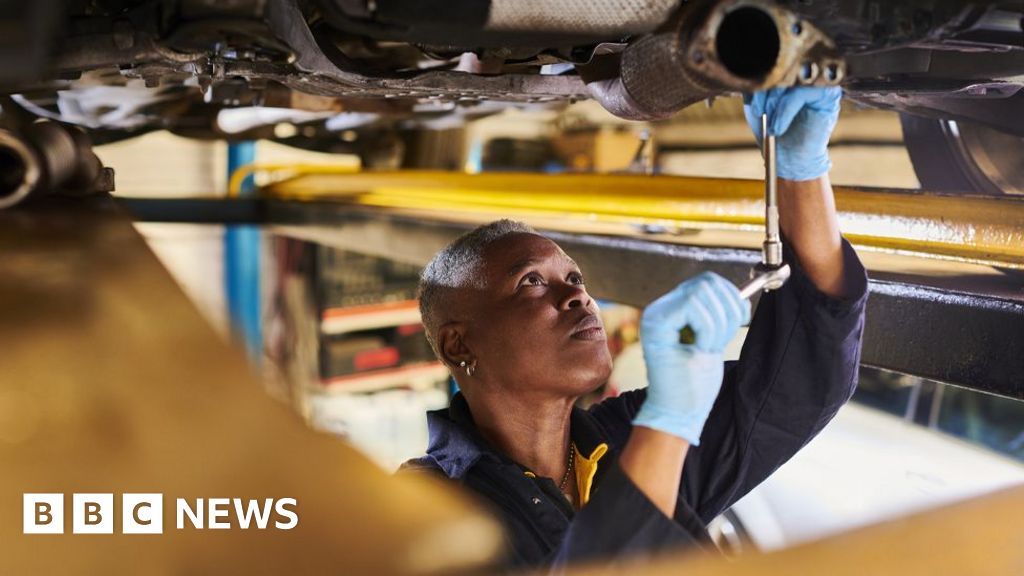ARTICLE AD BOX
Image source, Getty Images
Reports suggesting a US decision to maintain tariffs on British steel is linked to Brexit and Northern Ireland are a "false narrative", trade minister Penny Mordaunt has said.
She said wrangles with Brussels over the Irish border were "entirely separate" to trade with Washington.
It comes after the Financial Times reported the issue was stopping the UK resolving the steel row with America.
The US lifted tariffs on EU steel last month but kept them on UK steel.
Speaking in the Commons, Ms Mordaunt said the FT's report "might be true in terms of how some people in the US feel, but it is a false narrative. These are two entirely separate issues."
"We don't do ourselves any favours if we perpetuate these false narratives," she added.
The Trump-era tariffs of 25% on steel products and 10% on aluminium were imposed on the EU in 2018, when the UK was still part of the trading bloc.
The US agreed to end the duties on EU products in the autumn, but the tariffs, which nearly halved UK steel exports to its second largest market, remain in place on British steel.
The FT reported that US and UK talks to resolve the issue could not move ahead due to Washington's concerns over UK threats to trigger Article 16 of the Northern Ireland Protocol.
The protocol is a special Brexit deal which leaves Northern Ireland in the EU's single market for goods, while checks are imposed between Great Britain and Northern Ireland.
The idea was to prevent a hard border between Northern Ireland and the Republic of Ireland, which many feared would would have destabilised the Good Friday Agreement peace deal.
But it has increased red tape on trade between Northern Ireland and the rest of the UK, sparking rioting and violence this year in Belfast.
Downing Street has threatened to trigger Article 16 to override the protocol - something Washington has warned against.
Image source, Getty Images
Image caption,President Biden and head of the European Commission Ursula von der Leyen have both warned the UK against triggering Article 16
Analysis:
Chris Morris, global trade correspondent
The warnings have been coming thick and fast - and publicly - for some time. Washington is not impressed by UK threats to invoke Article 16 of the Northern Ireland Protocol.
That's true in the White House. It's also true within the vocal Irish lobby in the US Congress.
The UK and the EU have been holding talks on the effects of the Protocol - including checks and controls on goods moving from Great Britain to Northern Ireland.
The UK wants the text of the Protocol rewritten, and the Brexit Minister Lord Frost has called for more urgency in the discussion.
The EU has offered a package of measures which it says would reduce checks considerably.
It also argues that the UK needs to honour the agreement it signed up to, which is now part of an international treaty, rather than walk away from it.
The United States is backing that line.
It's true that negotiations on the steel tariffs and negotiations on the NI Protocol are entirely separate processes. But political links are being made in influential quarters in Washington.
The International Trade Secretary Ann Marie Trevelyan will travel to the United States next week for previously planned talks on the steel tariffs and other issues.
But if unresolved arguments about the Protocol start to have a direct effect on other trade matters, that will be a cause for concern in London.
Ms Mordaunt said that International Trade Secretary, Anne-Marie Trevelyan, would be holding talks about steel and other issues with her American counterparts next week.
She also defended the UK's approach to discussions on the Northern Ireland protocol: "We have acted in good faith. We will do more to tell America we have acted in good faith and we are determined to be pragmatic. Lord Frost [the Brexit Minister] is going to do that."
She was answering a question from the SNP MP and chair of the International Trade Committee, Angus MacNeil, who said: "Does she welcome America keeping control?" - a reference to the Brexiteer slogan that Brexit would allow the UK to "Take Back Control".
Earlier another International Trade Minister, Ranil Jayawardena described the punishing US steel tariffs as "unfair and unnecessary."
"We will continue to make representations to back British businesses," he said.
'We continue to engage'
The Department for International Trade spokesman said: "We welcome the Biden Administration's willingness to work with us and other likeminded allies to address trade issues relating to steel and aluminium, and it is encouraging that the US is continuing to take steps to de-escalate this issue.
"The International Trade Secretary is in regular discussions with both US Trade Representative Katherine Tai and Commerce Secretary Gina Raimondo on the issue and we remain focused on agreeing a resolution that sees damaging tariffs removed to the benefit of businesses on both sides of the Atlantic.
"We continue to engage closely with the administration on the Northern Ireland Protocol and we share a deep commitment to the Belfast (Good Friday) Agreement and the peace process."
Gareth Stace, director general of UK Steel, a trade group, said: "The UK's steel sector and our customers in the United States urge the UK and US governments to continue to work together to find a solution to the issue of Section 232 tariffs, and to strain every sinew to do so.
"On the 1st January, steelmakers in the EU will gain a significant price advantage over their UK counterparts.
"Already, customers in the United States will be factoring in January 2022 prices to their plans for the next year, which of course risks the UK sector losing market share in the US, to EU exporters."

 2 years ago
39
2 years ago
39








 English (US)
English (US)